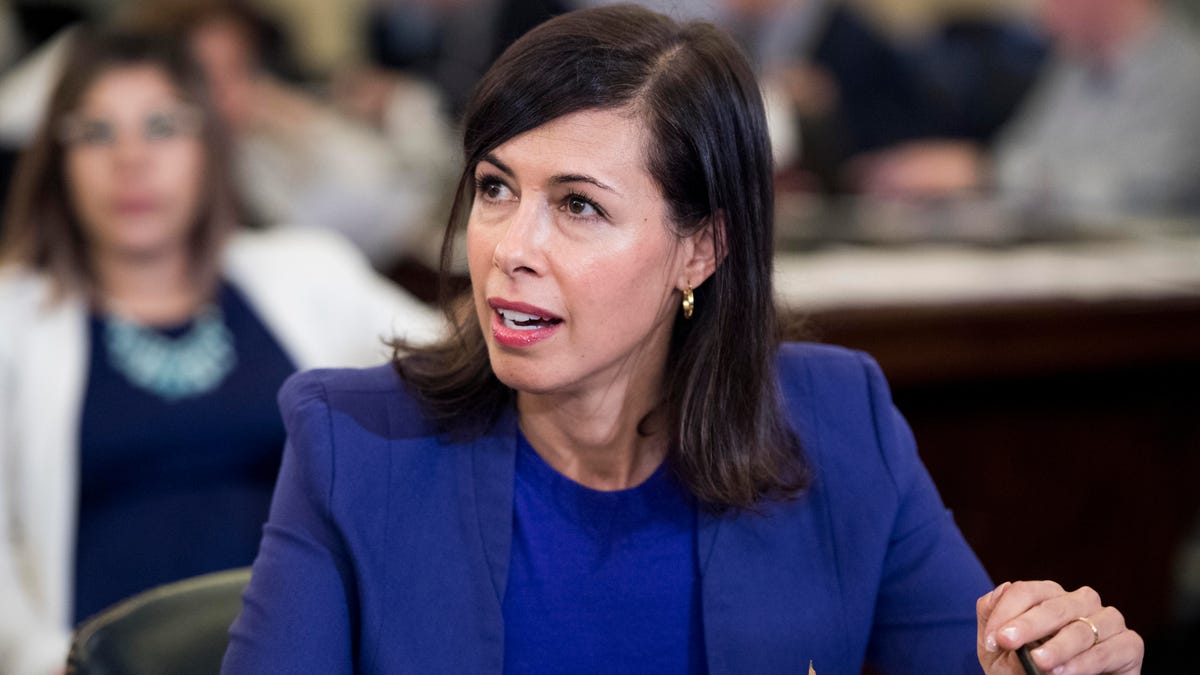Democratic FCC commissioner says Trump tariffs will hurt 5G
Jessica Rosenworcel reiterates in a tweet Friday that the 25% tariffs on Chinese imports will jeopardize US leadership on the next-generation wireless.

FCC Commissioner Jessica Rosenworcel has been an outspoken critic of President Trump's trade war with China.
Democratic FCC Commissioner Jessica Rosenworcel, along with some tech trade groups, say President Donald Trump's tariff hike on Chinese goods entering the US will slow the stateside rollout of 5G.
In a tweet on Friday, the lone Democrat on the commission said the tariffs, which more than doubled overnight, are "a 25% tax on the future of technology."
She added the tariff hike will have a negative effect on US wireless operators' plans to build 5G wireless networks and the innovation that's expected to come from these new networks.
"All the building blocks of 5G wireless and the internet of things -- from modems to antennas to semiconductors -- are subject to this new tax," she said. "It's not good -- for consumers, innovation or US leadership."
The tariffs that go into effect today are a 25% tax on the future of technology. All the building blocks of 5G wireless and the internet of things--from modems to antennas to semiconductors--are subject to this new tax. It's not good--for consumers, innovation or US leadership.
— Jessica Rosenworcel (@JRosenworcel) May 10, 2019
The comments come as Trump made good on his threat to increase tariffs from 10% to 25% on roughly $200 billion worth of imports from China, a move that many in the technology and telecom sectors have warned will hurt American consumers and businesses. The tariff hike went into effect Friday even as the administration continued trade talks with Chinese officials in Washington, DC.
Rosenworcel expressed similar concerns in an op-ed for Politico in September after Trump initiated the 10% tariffs on Chinese imports.
"The administration's trade war with China threatens to increase the costs of wireless infrastructure by hundreds of millions of dollars at a critical moment in the race to 5G," she said.
Rosenworcel wasn't alone in her criticism. The Telecommunications Industry Association (TIA), which represents many of the manufacturers and suppliers of high-tech communications networks, issued a statement earlier this week stating that the tariffs "will adversely impact our technological competitiveness relative to other countries and hurt our economy and consumers."
The Consumer Technology Association, which runs the annual CES gadget show and represents the US consumer technology industry, called the move "disastrous" and said the tariffs are ultimately not paid by China but by Americans.
"Tariffs are taxes, plain and simple," CTA president and CEO Gary Shapiro said in a statement. "And they're paid for by US consumers, workers and businesses -- not by China."
The global race for 5G
5G, which refers to the fifth generation of cellular technology, is the next big thing in wireless technology. It's been hailed as the foundation for other big trends like self-driving cars and streaming virtual reality.
US carriers have been pushing hard on 5G. Last year, Verizon started a limited 5G home broadband service. This year it launched its mobile 5G service. AT&T's 5G network went live in select cities in December and the carrier has steadily rolled out additional deployments this year. Sprint and T-Mobile are also expected to begin rollouts this year.
The race to 5G is also in full force outside the US. Early indications suggest the US may be lagging. In a study conducted by Analysys Mason and released last month, China had the best combination of wireless carriers committing to the technology, government backing for research, a clear rollout plan by 2020 and government commitment of wireless spectrum, or the radio airwaves critical to deliver wireless service.
After China, South Korea, then the US and Japan make up global leaders in 5G, according to the firm.
The Trump Administration has promised policies to help spur 5G development and network deployment. But it's also taken aim at Chinese telecom gear maker Huawei, which is considered a leader in 5G technology. The administration has pushed to ban the gear from US wireless infrastructure due to security concerns. The major wireless providers have complied, promising not to use the gear. The White House has also been urging other countries, like the United Kingdom, to also ban Huawei gear and technology.
How do tariffs affect US carriers?
Even though the large US carriers aren't using Chinese gear to build their networks, that doesn't mean the tariffs won't have impacts. Rosenworcel, Shapiro and others point out that many components like semiconductors or modems, which may be developed in the US and manufactured or assembled in China, will be subjected to the 25% tariff when they reenter the US.
For this reason, Shapiro said Trump's trade war is already helping China in the race to 5G, as the 10% tariffs imposed last year have already cost American businesses money.
"In less than a year under these tariffs, the US tech industry has paid over $745 million extra for 5G-related products," he said.
Shapiro added that he agrees with the administration that the US needs a trade agreement with China to protect intellectual property, "But raising tariff rates or imposing new tariffs on American families is not a winning negotiating tactic."

